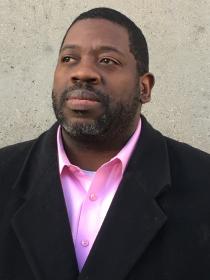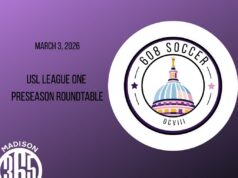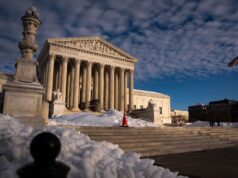One of the newest members to Dr. Carlton Jenkins’ Madison school cabinet is well-known pastor and former prosecutor David Hart.
Hart started as special assistant to the superintendent at Madison Metropolitan School District in the last month and said there are three facets to the position: policy, community engagement and special issues, particularly surrounding restorative justice.
And although he enjoyed his previous position as a prosecutor in the Dane County District Attorney’s Office, he believed in Jenkins’ vision.
“I really did enjoy the work that I was doing with District Attorney (Ismael) Ozanne,” Hart told Madison365. “I was doing really important work and really meaningful work — I was prosecuting domestic violence cases and hate crimes. But I chose to accept this role because I believe in Dr. Jenkins’s vision. It’s a clear vision, it’s an innovative one, it’s audacious and it’s something that this community needs and it’s long overdue.”
Hart said he is also excited to work with his fellow colleagues on the cabinet, which represents a diverse group of people.
“We’re certainly ready to do the work and there are some really top-notch, qualified folks that I’m working with, and I’m just grateful to be doing that,” he said.
Other members of the cabinet include Jorge Covarrubias, executive director of professional learning and leadership development; Deirdre Hargrove-Krieghoff, chief of human resources; Lisa Kvistad, assistant superintendent for teaching and learning; Marvin Pryor, chief of schools secondary education; Kelly Ruppel, chief financial officer and Sherry Terrell-Webb, general legal counsel.
“There are Black women represented at the table, there are white women represented at the table, LGBTQ people in senior staff, there are Latinx community members that are represented in the senior leadership and the cabinet,” Hart said.
Part of the vision for the district and the position, he said, is ensuring that the schools are in the community and that the community is in the schools.
“Schools are not in a vacuum. Students don’t learn in a vacuum. In order for them to learn and be effective and be at their best, the community has to be supporting,” he said. “There has to be business leaders and nonprofit leaders and community activists and other leaders that are circling our schools and wrapping their arms around the children and the young leaders to make sure that they’re successful. In turn, the community can’t understand the needs of the school, unless it exists out in the community… And so it has to be an interactive and a two-way conversation.”
‘Rethinking schools and discipline’
Since he started, among other things, a focus of Hart’s has been preparing for an April 7 meeting to guide a comprehensive policy on restorative justice, he said.
Through his experiences as a prosecutor and pastor of Sherman Avenue United Methodist Church of Madison, Hart said he has had great opportunities to work in restorative justice. He said there are three components: sense of community, intervention and student return.
He said it is time to rethink the way the school, the city and the area think about school and discipline.
The first piece, he said, is building a sense of community.
“If students don’t feel faith in their schools and that they’re part of a connected community that cares for them and is concerned for them and has their best interests at heart, and is, ultimately concern for their wellbeing; nothing else — none of our measures, none of our labors or efforts will work,” Hart said. “The first piece is building a sense of community and that’s going to take everybody in this city, in this area to wrap their arms around our students, our learners, our young leaders, and make that happen.”
Hart and his team will be looking at intervention and returning students to the school community with a restorative justice lens.
“Restorative justice really said that when there is a community and someone harms the community or breaks the relationship in the community we do have to take some steps to make sure that the community is made whole, and all of the actors in the community are made whole but that doesn’t mean suspension or expulsion all the time. And in fact; it shouldn’t.”
“Then the final piece that we’re going to be taking a look at closely is the returning piece,” Hart later added. “When someone has wronged the community or caused harm to the community and we have all gotten together and worked on a method to repair that harm, how do we return that student that young leader back to the community in a manner that they’re fully restored and that the community is fully restored. “










